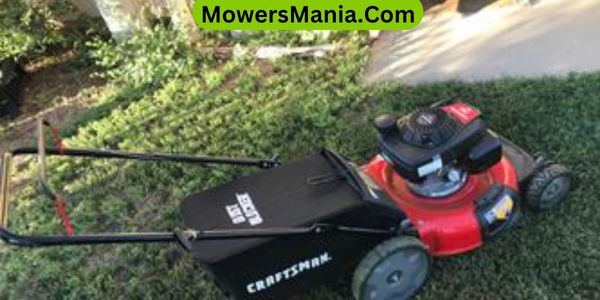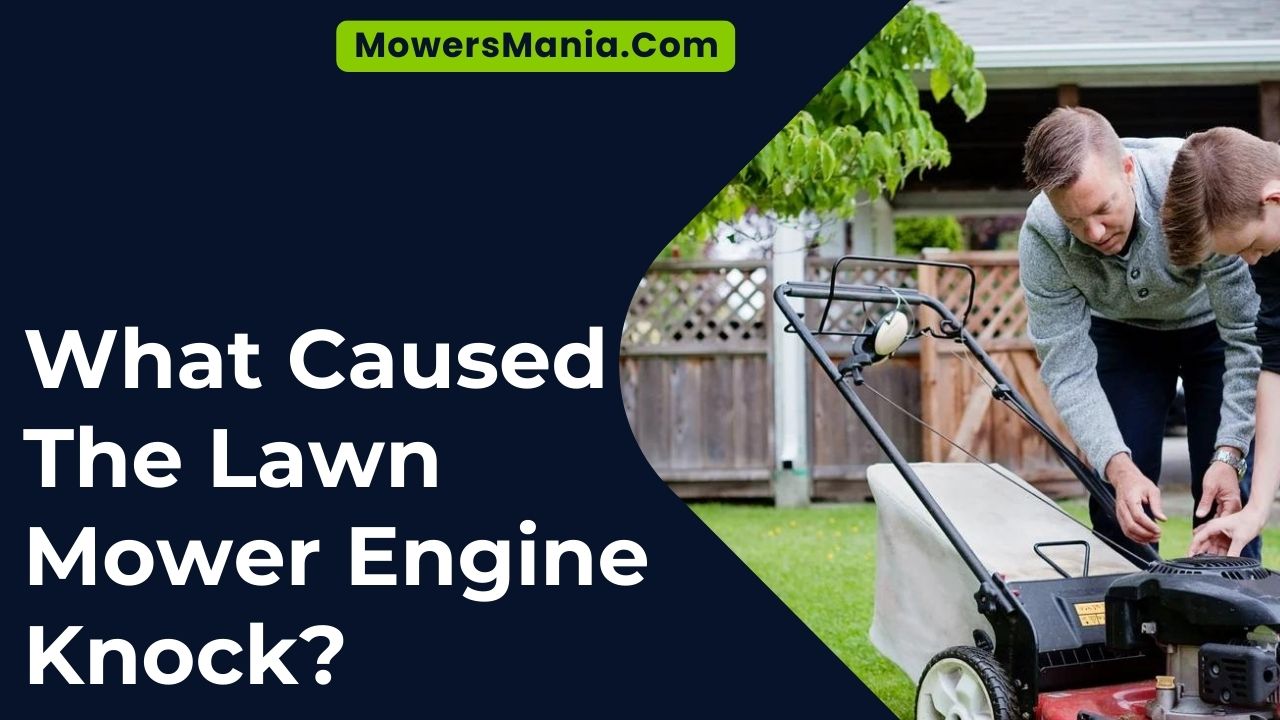When your lawn mower’s engine starts to knock, it’s like a warning bell, signaling potential trouble ahead. The cause of the knocking could be a variety of factors that you’ll need to address.
Ignition timing, fuel quality, carbon buildup, oil level and quality, and mechanical wear and tear can all contribute to that unsettling sound.

It’s important to identify and address the root cause of the knock to prevent any further damage to your mower’s engine.
Ignition Timing
If your lawn mower engine is experiencing knocking, it could indicate a problem with the ignition timing.
When the ignition timing is off, the spark plug fires either too early or too late in the engine’s cycle, leading to erratic combustion and the characteristic knocking sound. Ignition timing is crucial for the engine to run smoothly.
It determines when the spark plug fires in relation to the position of the piston. If the timing isn’t synchronized with the piston’s movement, it can cause knocking and potentially damage the engine.
To check the ignition timing, you can start by inspecting the spark plug and the ignition system for any visible issues.
If everything looks fine, consider using a timing light to ensure the timing is set correctly. If you find that the timing is indeed off, you may need to adjust the timing according to the manufacturer’s specifications.
Ignition timing issues can also arise from a faulty ignition system or a worn-out timing belt. It’s essential to address ignition timing problems promptly to prevent further damage to your lawn mower engine.
Fuel Quality
Check your fuel quality to determine if it’s causing the knocking in your lawn mower engine. Poor fuel quality can lead to engine knocking and other performance issues.
Here are three things to consider when assessing your fuel quality:
- Octane Rating: Ensure that you’re using the correct octane rating for your lawn mower engine. Using fuel with too low of an octane rating can cause knocking. Check your owner’s manual to find the recommended octane level for your specific mower.
- Fuel Contamination: Contaminants such as water, dirt, or other impurities can negatively impact fuel quality and lead to engine knocking. Inspect your fuel source and consider using a fuel stabilizer to prevent contamination.
- Ethanol Content: High levels of ethanol in gasoline can cause problems in small engines like those found in lawn mowers. Ethanol can absorb water, leading to fuel separation and engine issues. Look for ethanol-free fuel or use a fuel stabilizer designed to combat the effects of ethanol.
Carbon Buildup

To prevent carbon buildup that can lead to engine knocking, regularly clean your lawn mower’s carburetor and combustion chamber to maintain optimal performance.
Carbon buildup occurs when fuel combustion leaves behind residue that accumulates over time. This buildup can restrict the flow of air and fuel, leading to incomplete combustion and engine knocking.
To tackle this issue, start by using a fuel stabilizer to prevent fuel degradation. Additionally, consider using higher quality fuel with fewer impurities to minimize carbon deposits.
When cleaning the carburetor, use a carburetor cleaner to remove any existing carbon buildup. It’s also essential to inspect and clean the combustion chamber regularly to prevent carbon accumulation. If you notice significant carbon deposits, consider using a decarbonizing agent to break down and remove the buildup.
Regular maintenance, including cleaning or replacing air filters, helps prevent debris from entering the combustion chamber and contributing to carbon buildup.
Oil Level and Quality
Maintain the appropriate oil level and use high-quality oil to prevent engine knocking in your lawn mower.
Here’s what you need to know:
- Check the Oil Level Regularly: Make it a habit to check the oil level before each use of your lawn mower. Running the engine with low oil levels can lead to increased friction and heat, which may cause knocking and eventually damage the engine.
- Use the Right Type of Oil: Consult your lawn mower’s manual to determine the appropriate type of oil to use. Using the wrong oil viscosity or low-quality oil can lead to inadequate lubrication, resulting in engine knocking.
- Change the Oil at Regular Intervals: Over time, oil can degrade and become less effective at lubricating the engine components. Regular oil changes, as recommended by the manufacturer, are crucial to maintaining optimal engine performance and preventing knocking.
Mechanical Wear and Tear

How frequently should you replace the worn-out engine components to prevent the lawn mower engine knocking?
Mechanical wear and tear is a common cause of engine knocking in lawn mowers. Regular maintenance and timely replacement of worn-out components are crucial for preventing this issue.
Below is a table outlining the recommended replacement intervals for key engine components:
| Engine Component | Replacement Interval |
|---|---|
| Spark Plugs | Every 100 hours |
| Air Filter | Every 25 hours |
| Oil Filter | Every 25 hours |
| Fuel Filter | Every 100 hours |
| Belts | Every 100 hours |
| Blades | As needed |
Following these replacement intervals helps to ensure that the engine operates smoothly and efficiently. Worn-out spark plugs, clogged air filters, or old oil filters can lead to engine knocking and reduced performance.
Additionally, keeping the blades sharp and the belts in good condition is essential for proper engine function. By staying proactive with component replacements, you can prevent the onset of engine knocking and extend the life of your lawn mower.
Frequently Asked Questions [FAQs]
Can Using a Different Brand of Spark Plug Affect the Engine Knock in a Lawn Mower?
Using a different brand of spark plug can affect the engine knock in a lawn mower. A non-compatible spark plug might not ignite fuel properly, leading to engine knocking. Always use the recommended spark plug for optimal performance.
How Does the Altitude at Which the Lawn Mower Is Used Affect the Engine Knock?
At higher altitudes, the air is thinner, affecting the air-fuel mixture in your lawn mower engine. This can lead to engine knock due to incomplete combustion. Consider adjusting the carburetor to compensate for the thinner air and prevent engine knock.
Can Using a Fuel Stabilizer Prevent Engine Knock in a Lawn Mower?
Using a fuel stabilizer can prevent engine knock in a lawn mower. It helps maintain the quality of the fuel, preventing it from breaking down and causing knocking. Ensure to use the stabilizer as directed for best results.
Does the Type of Grass Being Mowed Affect the Likelihood of Engine Knock?
Mowing thick, wet grass can lead to engine knock due to increased strain on the lawn mower. It’s essential to adjust the mower’s height and avoid cutting overly dense areas to prevent engine knock.
How Does the Frequency of Lawn Mower Use Impact the Likelihood of Engine Knock?
Using your lawn mower frequently can lead to engine knock due to increased wear and tear. Regular maintenance, such as oil changes and spark plug replacements, can help mitigate this issue. Keep an eye on the engine’s condition.
Conclusion
So, if you’re experiencing a lawn mower engine knock, check the ignition timing, fuel quality, carbon buildup, oil level and quality, and mechanical wear and tear.
By addressing these potential causes, you can prevent further damage to your lawn mower and ensure it’s running smoothly for your lawn care needs.



